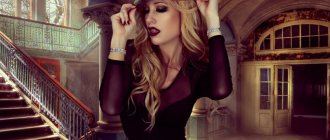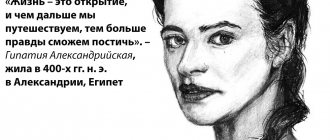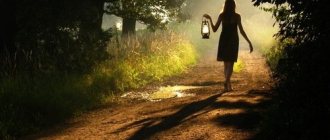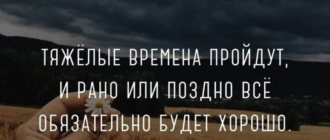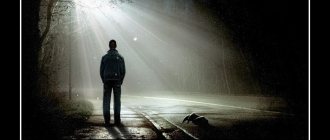Quotes from Hesse
Prepared by: Dmitry Sirotkin
I present to you a selection of quotes from the German writer Hermann Hesse (1877 - 1962).
Hesse's most famous works are devoted to spiritual quests .
Quotes are divided into topics: life ethics, human manifestations, man, love, life, wisdom, reality, books, time, thoughts, art, women, death, purpose, freedom, happiness, parents and children, truth.
Quotes about Hess are provided.
About life ethics
You don't have to hold on to desires that you don't believe in.
Easy life, easy love, easy death - this is not for me.
Desperately holding on to your “I”, desperately clinging to life - this means taking the surest path to eternal death, while the ability to die, shed the shell, forever sacrifice your “I” for the sake of change leads to immortality.
Learn to take seriously the things that deserve to be taken seriously and laugh at the rest!
Writing is good, thinking is better. Wisdom is good, patience is better.
You need to pay attention to everything, because everything can be interpreted.
Everyone who follows their own path in life is a hero. Everyone who accomplishes what they are capable of is a hero.
There is nothing in the world to be afraid of, nothing is scary - only in madness do we torment ourselves with all these horrors, only in our own frightened soul do good and evil, value and insignificance, lust and illness arise.
It is not for me to determine the paths of other people's destinies. Only for myself, for myself alone, I must decide, I must choose, I must reject.
For to sacrifice love of truth, intellectual honesty, loyalty, laws and methods of the spirit for the sake of any other interests, even the interests of the fatherland, is treason.
You can observe human stupidity, you can laugh at it or feel compassion for it, but you shouldn’t stop people from going their own way.
About human manifestations
Every person considers the suffering that befell him to be the greatest.
If you absolutely need someone's permission for your pleasure, then you are really poor.
When we hate someone, we hate in his image what is inside us. What is not in ourselves does not bother us.
All high humor begins with the fact that you stop taking yourself seriously.
With every shock in my life, I eventually gained something, this cannot be denied, I became freer, more spiritual, deeper, but I also became more lonely, more incomprehensible, colder.
A person in a state of deep sleep enters his innermost being.
You feel too strongly about your “I” or depend too much on it, and this is by no means the same as being a strong personality.
You are looking too much; Due to excessive searching, you do not have time to find.
And the most innocent person happens once or twice in his life to come into conflict with such beautiful virtues as respect and gratitude.
Solitude is independence, I wanted it and achieved it over many years. It was cold, like that cold, quiet space where the stars revolve.
If I cannot share your sorrows and sorrows with you and infect myself with them, it does not at all follow that I do not respect them and do not take them seriously.
People with courage and character are always very creepy to other people.
About a human
Most people don't want to swim before they learn how to swim.
The true calling of everyone consists of only one thing - to come to oneself.
We ourselves are history and we are also responsible for world history and for our position in it. We are sorely lacking in awareness of this responsibility.
Man is an onion consisting of hundreds of skins, a fabric consisting of many threads.
The stronger the personality, the more reprehensible the arbitrariness.
Only the weak are sent on a safe journey.
Most people are like falling leaves; they fly in the air, spin, but eventually fall to the ground. Others - a few of them - are like stars; they move along a certain path, no wind will force them to deviate from it.
By the way, quotes about a person
About love
Two people, no matter how close they are, are always separated by an abyss, which love alone tries to overcome step by step along a fragile bridge.
Love should not ask and should not demand, love should have the power to be confident in itself. Then it is not something that attracts her, but she herself attracts.
Love can be begged for, bought, received as a gift, found on the street, but it cannot be taken by force.
Ah, love does not exist to make us happy. I think it was created to show us how strong we are in suffering and patience.
I have loved twice in my life - I mean, truly - and both times I was convinced that all this would last forever and would only end with my death; and both times it ended, but I, as you can see, did not die.
About life
You can live life to the fullest only at the cost of your self.
And the most unhappy life has its bright hours and its flowers of happiness among the sand and stones.
Everything is repeated, everything that was not suffered to the end and redeemed.
You think you are close to God, but you hug a woman. You think that you have achieved harmony, but all you do is blame your guilt and your misfortune on a distant future being!
And how beautiful the world is when you look at it in this way - so simply, so childishly, without any searching!
By the way, quotes about life
About wisdom
Wisdom: Think pessimistically, act optimistically.
What one person considers his treasure and wisdom sounds like stupidity to another. Knowledge can be transferred, but wisdom can never be transferred. You can find it, you can live with it, you can make it your sail, you can work miracles with it, but it is impossible to put it into words, to teach it to anyone.
When we begin to despair of all faith, what consolation can it be for us to be able to follow the sage in his ways and see that at times he too was only a man, weak and imperfect.
He who truly seeks, who truly desires to find, cannot accept any teaching. The one who found it can approve any, yes, any teaching, any path, any goal.
By the way, quotes about wisdom
About reality
There is no reality other than the one we carry within ourselves.
The things we see are the same things that are in us. There is no reality other than the one we carry within ourselves.
For there to be decline and rise, there must be a bottom and a top. But there is no bottom and no top, it lives only in the human brain, in the homeland of illusions.
There is not a single thing in the world that would not be as beautiful, as desirable, could make you as happy as its opposite!
About books
Today everyone can acquire the skill of reading, but only a few understand what a powerful talisman they have been entrusted with.
Life is short, and on the other side of it no one will be asked about the number of books they have borrowed. And therefore, it is unwise and harmful to waste time on reading that is of no value. By this I mean not only bad books, but first of all the quality of the reading itself.
Anyone who reads for the sake of spending time, even if he reads a lot and only the very good, best books, will read them and forget them, and in the end he will remain the poor man he was. But if you read books the way we listen to the speeches of friends, they will open up to you and become yours. What you read will not slip away and will not be lost in memory, but will remain with you, will belong to you, will delight and console you in the way that only friends can.
By the way, quotes about books
About the time
From everything a person craves, he is always separated only by time! It is one of the supports, one of the bridges that must first of all be abolished if you want freedom.
Isn’t all suffering this is time, isn’t all self-torture and fear this is time, isn’t everything difficult, everything hostile in the world vanished, vanquished, as soon as you conquer time, renounce time in your thoughts?
The past has passed: whether it was successful or whether it would have been better not to have existed at all, whether we recognize some kind of “meaning” behind it or not - all this is equally devoid of meaning.
By the way, quotes about time
About thoughts
Only those thoughts by which we live have value.
As soon as you express a thought out loud, it takes on a slightly different character, it sounds a little false, a little stupid.
There is no importance in judgments, whatever they may be - beautiful or ugly, smart or foolish, anyone can be committed to them or can neglect them.
By the way, quotes about thoughts
About art
Writing bad poems makes a person much happier than reading the most beautiful poems.
The creations of the spirit, culture, art, are the complete opposite, they are always liberation from the slavery of time, a man’s leap from the mud of his instincts, from his inertia to another plane, into the timeless, allowed by time, the divine, completely ahistorical and hostile to history. being.
By the way, quotes about art
About women
There is no woman in the world without whom you cannot live, and there is no woman with whom you cannot get along.
She was a window, a tiny bright hole in the dark cave of my fear. She was salvation, the path to freedom. She had to teach me to live or teach me to die, she had to touch my numb heart with her firm and beautiful hand, so that it would either blossom or crumble into dust from the touch of life.
By the way, quotes about women
About death
Do ideals exist to be achieved? Do we humans live to abolish death? No, we live to fear it, and then to love it again, and it is precisely thanks to it that life glows so wonderfully at other times.
When an artist paints a picture, and a philosopher looks for laws and formulates thoughts, this is only in order to save at least something from the great dance of death, in order to create something that will outlive us.
About the goal
If an animal or a person directs all his attention and all his will to a specific goal, then he will achieve it.
When a person searches, it happens that his eye sees only what he is looking for, and he is not able to find anything, is not able to perceive anything, because he always thinks only about what he is looking for, has a goal, is obsessed with this goal. To seek means to have a goal. And to find means to be free, wide open, without a goal.
By the way, quotes about the goal
About freedom
The power-lover perishes from power, the money-lover from money, the slave from slavery, the pleasure seeker from pleasure. So Steppenwolf perished from his independence.
If the College calls you to take a certain position, then know: each next step is not a step towards freedom, but a new obligation. The higher the position, the greater the obligation. The greater the power, the stricter the service.
By the way, quotes about freedom
Oh happiness
Happiness has nothing to do with reason or ethics; in its very essence it is something magical, belonging to the archaic, youthful stages of humanity.
If we can make a person happier and more cheerful, we should do it in any case, whether he asks us to or not.
By the way, quotes about happiness
About parents and children
No one marries to have children, but when a person has children, they will force him to change, and in the end he will see that everything was done only for them.
You can't live without a mother. You cannot die without a mother.
By the way, quotes about parents
About truth
The truth is lived, it is not taught.
About every truth you can say something completely opposite to it, and it will be equally true.
About miscellaneous
Animals are more real than people. They don't want to flatter you, they don't want to make any impression on you. Nothing ostentatious. They are what they are, like stones and flowers or like stars in the sky.
Most of the things we are taught are, of course, quite true and correct, but you can look at everything completely differently from the teachers, and then for the most part they acquire a much better meaning.
Not all friends of youth stand the test of time.
Youth ends with selfishness, old age begins with living for others.
God does not send us despair to kill us, he sends it to us to awaken new life in us.
It would probably to say that Hesse remains one of the most popular writers of the 20th century. However, it turns out to be difficult to get past it .
Quotes about Hesse
- S. Zweig: The life-giving purity of expression characteristic of his prose, the remarkable skill with which he conveys in words even the most inexpressible states, definitions... Hermann Hesse’s very special place in German literature... Today the scale of his activity has not yet been fully revealed and his extreme possibilities.
- T. Mann: In the generation of writers to which I belong, he, who has now reached biblical age, was from the very beginning chosen by me as the closest and dearest person to me, and I watched his growth, feeling great sympathy for him, supported as both in what we were different from him and in what we corresponded to each other.
- M. Buber: Hermann Hesse serves the Spirit due to the fact that he, as a Storyteller, narrates the contradiction between Spirit and Life and the dispute of the Spirit with itself. And due to this, it also makes it possible to more fully experience the hardships of that thorny path, which can lead to some kind of new Integrity and unity. However, as a man, as the homo humanus that he is, he devotes himself to this service and constantly, where it makes sense, speaks out in defense of the integrity and unity of the human being.
- A. Gide: For Hesse, only the form of expression is balanced, but not sensation and thought. And restraint in the expression of feelings and thoughts is determined by a subtle, heightened sense of proportion, harmony and - in relation to the world - universal interdependence. It's a kind of hidden irony - a gift that, it seems to me, only a very few Germans have.
- S. Averintsev: Let’s look again at the reflection of Hesse’s face in other people’s eyes. A quiet idyllic of the 900s and a violent outcast of bourgeois prosperity in the period between the two world wars; an elderly sage and teacher of life, in whom others were quick to see a spiritual bankrupt; the old-fashioned master of “well-tempered” German prose and the idol of the long-haired youths of America - how, one wonders, can one bring together such diverse faces into a single image? Who was this Hesse really? What fate drove him from one metamorphosis to another?
- S. Dovlatov: Hesse was a naive man of the last century. It never occurred to him that evil could be absolutely conscious. And even principled. (by the way, quotes from Sergei Dovlatov)
In addition you can read:
- Remarque quotes
- Hemingway quotes
- Kafka quotes
- Camus quotes
- Sartre quotes
- Fromm quotes
I would be grateful if you share the link to the article on social networks with your friends. Use the network buttons below .
Comments are also highly welcome!
LiveInternetLiveInternet
Thursday, August 09, 2012 10:34 + to quote book Nikolai_Kofyrin
all posts by the author On this day 50 years ago, August 9, 1962, Nobel Prize winner in literature writer Hermann Hesse died.
Recently I was lucky enough to fulfill my long-time dream - to visit the house-museum of Hermann Hesse in the village of Montagnola, near Lugano (Switzerland). Hermann Hesse Museum in Montagnola - founded in 1997 in the Torre Camuzzi building, near Casa Camuzzi, where Hermann Hesse lived between 1919 and 1931. Among the exhibits are the writer’s personal belongings, his paintings, photographs and manuscripts. Among other things, various thematic lectures dedicated to the work of Hesse are held here. I wrote to the director of the museum, Regina Bucher, and she invited me to visit the museum completely free of charge. They were even allowed to take photos and videos, although this is prohibited for ordinary visitors. As a gift, I was offered to choose any book by Hermann Hesse (I chose “Siddhartha”) and put a commemorative stamp on the book. In response, I donated to the museum my novel “Stranger Strange Stranger Extraordinary Stranger,” in which I portrayed Hermann Hesse, my favorite writer, as one of the characters. When I first read Hermann Hesse’s novel “Steppenwolf” in a day and two nights (in the journal “Foreign Literature” No. 4 and 5 for 1977), I recognized myself in it. And I also felt that I would definitely write something similar. Ten years later, I published a research novel, Strange Strange Strange Stranger, in which Hermann Hesse is symbolically present. Hermann Hesse has always been a stranger, a strange, incomprehensible, extraordinary stranger. That's why he became the hero of my novel of the same name. I am a supporter of the biographical method in literary criticism, and I believe that a book should be looked at over the shoulder of its author. The memoirs “Herman Hesse about himself” as presented by Bernhard Zeller helped me a lot with this. I discovered a lot of similarities between the creative biography of Hermann Hesse and my creative self. “When I first read your book, I found in it much of what I myself unconsciously felt,” wrote a German student. And a high school student from Tokyo said: “... the more I read your books, the more I find myself in them.” “I believe that meaninglessness can be overcome thanks to the fact that I do not get tired of looking for the meaning of my life again and again,” wrote Hermann Hesse. “I believe that a person is responsible not for the meaning or nonsense of life in general, but for what he does with his own, one-time life.” Hermann Hesse was born on July 2, 1877 in the town of Calw (Germany) into a family of German missionaries. His mother Maria Gundert was born in India in the family of theologian Hermann Gundert. Herman's father, Johannes Hesse, was from Russia, a Baltic German, served as a missionary in India, and was engaged in literary activities. Herman was born into a believing family, where they read the Bible, knew about Buddha and Lao Tzu, where everything was permeated with pietism. From early childhood he discovered not only versatile talents, but also inflexibility of character. This is what the mother wrote in her diary about little Hess. “...The guy feels a gigantic vitality, a powerful will and, indeed, a kind of absolutely amazing understanding for his four years. What will come of this? My life is undermined by this internal struggle with his sublime tyrannical spirit, his passionate rebellion...” In 1881, Herman became a student at a local missionary school, and a little later at a Christian boarding house. He considered the school a hostile force, against which it was fair and justified to fight by any means. “I have always been a touchy, critical student who resisted any dependence and any loyalty...” He writes poems and stories in his school notebooks. “From the age of thirteen one thing was clear to me - I would either become a poet or nothing at all.” His first literary experience was the fairy tale “Two Brothers,” written in 1887 at the age of ten for his sister Marulla. In 1890, Herman went to study at a Latin school and a year later entered the seminary at the Maulbronn monastery. One day he runs away from school. This flight marks the beginning of severe mental conflicts, expressed in nervous crises and the struggle for self-affirmation in defense of one’s own “I”. “For more than four years, all efforts to influence me came to nothing, no school could hold me, no study lasted long. Any attempt to make me a suitable person for society was unsuccessful; several times everything ended in shame or scandal, flight or expulsion...” Herman feels like an outcast, arguing with God and the world. Six months after admission, Hesse leaves Maulbronn, but the young man’s mental state worsens, he attempts suicide. The parents decide to send Herman to a psychiatric clinic in Stetten. At the end of 1892, Hesse began studying at the Cannstadt gymnasium, but even here he could not adapt. Although Herman had friends, he felt like an outsider and a loner. “It’s strange, but starting from my school years, I was doomed to loneliness everywhere, which eventually became friendly for me.” At the age of 13, Hesse could say about himself: “I then had a difficult character, and I could be considered a rather ill-mannered son - my parents could no longer cope with me.” Herman owes a lot to his father, primarily for guidance in reading. But the father, absorbed in his own literary works, has little interest in his son’s activities. A year later, on the advice of his parents, Herman gets a job as an apprentice at the Esslingen printing house. This endeavor also did not end in success. Herman returns to Calw, where for some time he helps his father in the missionary publishing house. In 1894-1895, Hesse worked as a mechanic at the watch factory of Heinrich Perrault. “My daily prayer is a prayer that I will preserve my own inner peace, that I will not perish.” In 1895, Herman left home and got a job as a bookseller's apprentice in Heckenhauer's store, where he worked for four years. During the day, he sells books in a store. And “in the evenings I escape from the outside world into the inner world, the world of books, and engage in systematic literary, historical and spiritual research in general, which, I hope, may be useful later.” German devotes all his free time to self-education and reads a lot. “Every hour seems lost to me if I don’t spend it reading good books and magazines...” “So sometimes I am strongly attracted to sources of knowledge, but academic studies seem to me not only not ideal, but narrowly insufficient, like everything earthly.” Hermann begins to write poetry, some of which appear in one of the Viennese literary newspapers. His first published poem was "Madonna" in 1896. In 1899, using the money he saved, Herman published a small book called “Romantic Songs.” In the same year, the first collection of short stories, “An Hour After Midnight,” was published. But both books are published in small editions and sell poorly. “As for the title of my first book of prose, its meaning was completely clear to me, but obscure to most readers,” Hesse complained. Since the autumn of 1899, Hesse has worked in Reich's bookstore in Basel. In 1901, “The Works and Poems of Hermann Lauscher, Published Posthumously by Hermann Hesse”, a collection of autobiographical stories, was published. “My theme is to depict the sphere of humanity and love, the sphere of intimate life and sublimation,” Hesse wrote. “The fact that my writings are purely personal attempts to express intimate things in a modern form, that they are therefore not suitable for large circulations, I hardly need to emphasize. I don’t write very much and only based on personal needs.” Gradually, Hesse's first works became famous in the highest literary circles of Germany. In January 1903, Hermann received a letter from the Berlin publishing house of Samuel Fischer, who invited the young writer to collaborate. A few months later, Hesse sent the manuscript of his first novel, Peter Camenzind, to Berlin. This book became very popular among German youth and brought Hermann fame and financial independence, which allowed him to engage in writing. “I wanted to bring modern man closer to the majestic and wordless life of nature, to teach him to love this life. I wanted to teach him to listen to the pulse of the earth, to make him feel like a part of nature, so that in the hustle and bustle of everyday life he would not forget that we are not gods who created ourselves, but children and particles of the earth and the cosmic whole.” Peter Camenzind “strives from the world and society back to nature, he repeats in miniature the half-masculine, half-sentimental rebellion of Rousseau and on this path becomes a poet.” “My most burning problem was not the state, society or church, but the individual, the individual, the unique, abnormal individual.” Hermann Hesse wanted to go his own way, did not want to adapt. He was not created for life in a team. He created his own spiritual kingdom and was a lonely king in the dream kingdom he himself created. “I also wanted people to be able to find sources of joy and keys to existence in brotherly love for nature; I wanted to preach the art of contemplation, wandering and pleasure in order to rejoice in the world around them.” In Basel, Hesse meets his future wife Maria Bernoulli. After traveling together in Italy in 1904, Herman and Maria get married. In the autumn of 1904, Hesse and his wife moved to Gainhofen, then a small village on the shores of Lake Constance. The family settles in an ordinary peasant house far from the benefits of civilization. Three years later, the writer buys a plot of land here, builds a new house and arranges a garden. In 1905, son Bruno was born, and a few years later two more would appear: Heiner and Martin. After several years of living in a house in Gainhofen, Hesse increasingly feels that this life has exhausted itself. He is overwhelmed by doubts and worries, he feels like a stranger in his own home. “For me, over the years, my relationship with my family is limited more and more by the fact that I suffer in order to get money to support it...” “... is an artist or a thinker - a person who not only instinctively lives life, but first of all wants to be married? consider and present it as objectively as possible.” In the autumn of 1911, Hesse went on a long journey. He wants to see India, the country where his grandfather Hermann Gundert and grandmother Julia Dubois lived for a long time, where his father worked and where his mother was born. During the voyage, the writer will visit Sri Lanka, Indonesia and Singapore. Upon his return, he published Notes on an Indian Journey. “I have been given the gift of following the voice of life, which sounds in me the same way as when I could not understand its meaning and purpose, just as when it increasingly wanted to lead me away from the joyful path into darkness and the unknown.” Herman longed for freedom. But freedom from any connections could be purchased only at the price of renouncing burgher happiness - family and home life. The conflict grew between the pragmatic world and the contemplative existence of the poet. In the story “Three Stories from the Life of Knulp,” the main character meets God, with whom he begins to argue about the aimlessness of his wrecked life. “Listen,” the Lord tells him, “I needed you the way you are. In my name you wandered and awakened in sedentary people a vague longing for freedom. In my name you did stupid things and were ridiculed; It was I myself who was ridiculed in you and loved in you. You are my child, my brother, you are a part of me, everything that you experienced and suffered, I experienced with you.” When the First World War began, Hesse wrote: “May this ill-fated war make us feel more deeply than ever that love is higher than hatred, understanding is higher than bitterness, peace is nobler than war.” In the spring of 1915, Hermann wrote in a letter to his friend Alfred Schleicher: “Nationalism cannot be an ideal - this is especially clear now, when the moral foundations, internal discipline and intelligence of spiritual leaders on both sides have shown complete failure. I consider myself a patriot, but first of all I am a man, and when one thing does not coincide with the other, I always take the side of the man.” The war, the death of his father, his wife’s illness - all this contributes to the deterioration of Hesse’s mental state. Hoping to cope with his mental crisis, the writer goes to Lucerne, where he meets Dr. Joseph Lang, who later became a close friend of Hesse. From June 1916 to November 1917, Lang conducts 60 psychoanalysis sessions with him, which are more reminiscent of psychotherapeutic conversations between friends. “Every person’s life is a path to himself. But no person has ever been himself entirely and completely, everyone nevertheless strives for this... every person is a throw of nature towards man...” In 1919, the novel “Demian, or the Story of Youth” was published, which Hesse published under a pseudonym Emil Sinclair. Hesse hid his authorship from everyone, even from his friends. “I was a seeker and still remain one, but I am no longer searching in the stars or in books, I am beginning to hear what the blood roaring within me teaches me. My story is devoid of pleasantness, it does not have the sweet harmony of fictional stories, it smacks of nonsense and mental turmoil, madness and delirium, like the life of everyone who no longer wants to be deceived.” In January 1919, in three days and three nights, Hesse wrote The Return of Zarathustra. “Few have known their fate. Few lived their own lives. Learn to live your life! Learn to know your destiny! - Zarathustra called on the young men. “You must learn to be yourself... You must learn to be different, even to be nothing, to imitate other people’s voices and consider other people’s faces to be your own...” “My service and profession is humanity. Both are necessary, but it is hardly possible to serve both at the same time. Politics requires the existence of a party, humanity prohibits a party.” “For a long time I castigated myself before the gods and laws, which were just gods for me. This was my delusion, my torment, my complicity in the misery of the world. The path of redemption led me into my own heart, and only from there to God, and only from there to the world.” In February 1919, Herman and Maria decide to separate, and the writer leaves Bern. Hesse's new home was the village of Montagnola in the suburbs of Lugano. Here the writer rents four rooms in the Casa Camuzzi building and lives as a hermit. “I turned into a little burnt-out writer, into a shabby and somewhat suspicious stranger...” “The path of development of all mankind is reflected in my soul, and in fact the slightest movement of my soul is as important as any changes in the outside world...” Wonderful landscapes and a wonderful the atmosphere of these places inspires Herman to create new works; he writes and draws a lot. “I painted my dreams,” Hesse said about painting. Hesse was called "the sage of Montagnola." Based on an intense discussion with the Indian world of faith, Hesse created the story “Siddhartha. Indian poetry". This essentially allegorical novel was published in 1922. Siddhartha is the name of the historical Buddha Siddhartha Gautama. But “My Siddhartha,” said Hesse, “puts above not self-knowledge, but love...” Siddhartha devotes his life to the search for Atman, the One, which is in every person. From a brahman he becomes an ascetic and a beggar, making a pilgrimage to Buddha Gautama. Siddhartha does not accept his teachings. One cannot become a Buddha through teaching; this goal must be achieved through one's own experience. At the river, Siddhartha meets the ferryman Vasudeva, who teaches him to listen carefully to the river and learn from it. “Tell me, River, what is the Eternal Meaning of Life, the Essence of Existence, the One Law? How can I live in this fleeting life? And why was I born into the world? - Ask the Stars, ask the waterfall, to which I have been rushing since ancient times. I love everyone, and I’m only happy about this, and I won’t refuse to help anyone. Live like me, calmly and humbly, create love, and know the limit in everything, be patient, be persistent, and help everyone who asks. Life is a segment of the Being of space - so I flow from nothing into nothing, giving the opportunity to live and multiply; throughout my Law of Everything. Within the flow of all the strength of my life. Changeable - I am unchanged. Calm and clean, a source of food for many. And in this I see the meaning of my existence.” (from my true-life novel “The Wanderer” (mystery) on the New Russian Literature website “My destiny is that I, a writer, do not give up trying to understand and love the world, instead of trying to master the art and laws of thinking..." “To comprehend the world, to comprehend, to despise - let great thinkers do this. For me, only one thing is essential - the ability to love the world..." From the first days of 1926, Hesse began working on writing "Steppenwolf", one of the most important works in his work. He understood creativity like a confession. "Steppenwolf" is a meeting with one's own soul in hell, a terrible path to oneself. When the book came out, it was not understood. No other work was so misunderstood, no other work needed explanations from the author But after three decades, the Stepnoy Wolf had a huge success in America and Germany. I can not give you anything but your soul. I can not give you anything but an occasion. I will help you see your own world, and that’s all. ” The novel "Steppe Wolf" is largely autobiographical. It reflects the strongest spiritual crisis in the life of the writer, which took place in the mid-1920s and even thoughts of suicide. The novel was embodied by the results of psychoanalytic conversations with Dr. Jung, a hobby for jazz music and American dances. In the winter of 1926, Hesse specifically took dance lessons from Julia Laubi-Onegger (a prototype Hermina in the novel "Steppe Wolf"). The atmosphere of eroticism and ecstasy, experienced by Hesse at one of the night balls at the Bor O Lacques Hotel, is reproduced in the novel in the scenes of the masquerade in the halls of Globus. “Almost all my prose things are spiritual biographies, not the narrative of events, ups and downs and conflicts, but, in essence, monologues, which depicts one single person-that very fictitious figure-with all its relations to the world and one’s own“ I ” . The novel in its structure is a kind of "book in the book." The narrative begins with the preface of the publisher, who decided to publish notes left by the main character and entitled "Notes of Harry Galler (only for crazy)." In the afterword to the Swiss edition of the novel, Hesse wrote: “Of course, I cannot, and I do not want to prescribe to the reader how he should understand my story. Let everyone take from him what will consider for himself suitable and necessary! Nevertheless, I would be pleased if many of the readers noticed that the history of the steppe wolf, although he portrays disease and crisis, but not the disease that leads to death, is not death, but its opposite: healing. ” The metaphorical image of the “steppe wolf” symbolizes the desire of the person to mental freedom, the release from the yoke of civilization. In the philosophical meaning, the symbol of the “steppe wolf” dates back to the Nietzschean contrast of a herd person and a “differentiated loner”, whom Nietzsche in some cases calls the “beast”, as well as “genius”. In psychological terms, the image of the wolf symbolizes the dark side of the human psyche, which, as a rule, is supplanted into the subconscious, but which should be removed from the depths and reconcile with conscious life. The “Treatise on the Steppe Wolf” and the Magic Theater made such a strong impression on me that I could not avoid influence, and I portrayed something similar in my novel “A strange strange obscure unusual stranger”. I always doubted the possibility of filming this literary masterpiece. And when he watched the film “The Steppe Wolf”, shot by director Fred Hines, was convinced of the fairness of his assumption. In the summer of 1927, Hesse celebrated his fiftieth birthday with friends. There was Ninon Dolbin, an Austrian cultural historian with whom Hesse corresponded for many years. They began to live together, and in 1931 they got married. Dr. Kh.K. Bodmer, a faithful many -year -old friend, built a house at the request of Hesse at the request of Gesse) and provided his beloved author at the disposal until the end of his life. In the same year, Hesse begins to write “Game in Beads” - the last large work that he worked on from 1931 to 1942. This is a philosophical essay, disguised as a surrealistic novel. The action of the work is built around the Order of Intellectuals, located in the fantastic province of the future castal. The game of beads is a synthesis of all branches of art in one, universal art - the art of composing a metatex. Hesse wrote: “Once, many years before I tried to write, I was dreamed of an individual but nadimal life path: I imagined a person who, born again and again, turns out to be a contemporary of the great eras of the history of mankind.” The protagonist of “Games in Beads” is Joseph Knecht. In translation, his name may mean “school teacher”. Reaching the upper hierarchy, Knecht throws everything and leaves Castalia. “There is truth, my dear” but the “teachings” that you long, the absolute, giving perfect and the only wisdom, is not such a teaching. Yes, and you have to strive, my friend, not at all to some kind of perfect teaching, but to improve oneself. The deity is in you, not concepts and books. They live in truth, they do not teach it. ” I began to read the novel “Game of Beads” twice, but, apparently, I was not ready spiritually. Only ten years later I read the novel, and literally in one breath. The main idea of the novel - “Truth should be lived, not taught” - remained in me forever. In mid-March 1933, Hesse writes in a letter: "... if I-a loner and" dreamer "-is now more conscious than ever-it comes from complete awareness, and I see in this not only a curse, but also a purpose." The preservation of the “higher willfulness” was revered by Hesse not only as the task of literature, but also as the basic principle of his own existence. In 1946, Herman Hesse was awarded the Nobel Prize in literature with the wording "for inspired creativity, in which the classical ideals of humanism, as well as for a brilliant style, are manifested." Herman Hesse died on August 9, 1962. By the 85th anniversary of Hesse, the community of Montagnola chose him as its honorary citizen. He lived here for more than four decades. There is a theory that each person reaches at a certain age the complete disclosure of his own essence and internally retains this age of life, even when externally ages. Herman Hesse in his soul always retained the age of a twenty -year -old tramp, an eternal wanderer, a seeker of truth. Despite all the vicissitudes of life, Hesse always had the courage to follow the words of the book about Tao that the path, and not the goal is the meaning of life. The spiritual life of Hesse is the path to self -sufficiency - “The Way inside” - this was the name of the book, uniting three stories about Klungzor and Siddhartha. Herman Hesse believed that true art could speak clearly and simply about the most complex things. A true reader must be loving. "Reading without love, knowledge without reverence, education without a heart - our worst misconduct before the spirit." "... It is important not the amount of read and learned, but independent, free selection of masterpieces ... The idea of the breadth and wealth of human thoughts and aspirations." Herman Hesse did not leave behind either diaries or memories. But he left behind more than 35,000 letters, many poems and drawings. In a poem, originally called “transcendental”, Hesse writes: the flower worships, youth is fleeting. And on the age of human step, any, any wisdom is temporary, finite, and any good is measured for sure. So, let, the call of life answering, the soul will easily and cheerfully say goodbye to what to bind to bite firmly, let it dry in the margin of monastery! In any beginning, magic lurks, it is to help us, our defense is in it. You can’t look for the refuge, do not take root, a step behind a step, without sadness, step forward, go from Dali, everything is shore, to rise higher! The circle of cute habits sucks, the comfort of rest is full of temptation. But only the one who is from the place to get out in power will save his spirit alive from decomposition. And even near the entrance of the grave, life again, you see, the call of the call will click on us. And the path will begin again continuous ... Forgive me, your heart, and stuck again. Just believe in yourself and by virtue of the spirit that you are alive and alive with you. You open his voice for hearing. Go after him and become yourself. There is no happiness, just as there is no misfortune. Only the joy is complete in everything. Open it you are overnight, and you may become a deity. You will penetrate into the world of inaudible sounds, you will see everything, closing your eyes, open your heart to the secret of spirits, and the truth will enter you. ” (From my novel “Alien Strange Incomprehensible Unusual Stranger” on the website, New Russian literature PS, I thank the director of the Herman Hesse Museum in Montagnol Madam Regina Bucher and the museum’s employees for the opportunity to visit the museum and make a video. And in your opinion, the truth should be lived or taught ? © Nikolai Kofyrin - New Russian literature - https://www.nikolakofyrin.ru Tags:
Steppe wolf German Hesse Nikolai Kofyrin game game
Cited 3 times Liked by: 1 user
Like share
0
Like
- 1
I liked the post - Quoted
- 0
Saved
- Add to quote book
- 0
Save to links
Liked1
0
“Erotics of Text”: “Steppenwolf” by Hermann Hesse
The 20th century became a point of no return for the world of classical values, a kind of push into the abyss that turned out to be wars, revolutions and social upheavals. “Reassessment of values” and a rapid change in the dominant paradigm led to the birth of a new type of person, with new demands and views on life. In turn, art, designed to study the problems of reality, is experiencing the same dramatic changes - literature explores and exploits the theme of a newly born hero, a hero of a new era, standing on the border between the classical system of axiological coordinates and a new, not yet born, paradigm.
One of the cult works exploring the problem of man in the 20th century is Steppenwolf, published by the (already) German classic Hermann Hesse in 1927. The novel was written in the then popular style of intellectual and philosophical prose. “Steppenwolf” is a panoramic novel that reveals to the reader the figures and folds of the mental world of the main character, Harry Haller.
In structure, Hesse's Steppenwolf is a “book within a book.” For the reader, the narrative begins with an immersion into Harry's world through his diary - "The Notes of Harry Haller (For Crazy People Only)", in which he describes the vicissitudes of his mental life. Haller is a loner by nature and prefers his own company to the company of other people.
Harry rents a small, unremarkable room, content to be alone in it. He re-reads the books laid out everywhere, highlighting something significant in them for himself. Listens to classical music, especially Mozart. His evenings are filled with highly intellectual leisure, in which he sees his salvation from a society experiencing the death of moral principles.
But at some point, Harry begins to feel a contradiction eating away at him from within. That same wolf awakens within him and demands to immerse himself in a world far from the evenings filled with deep meanings. This is a dark world of instincts, unbridled savagery and cruelty. In his soul there is a confrontation between two opposing principles: the “human”, with its inherent culture, spirituality, rationality, and the “animal” - expressing everything actively repressed and suppressed by humanity for many centuries (biological, instinctive), and so inopportunely surfaced in the social surface at the beginning of the twentieth century.
Trying to resolve the conflict and restore spiritual harmony, Harry discovers another layer of the problem, superimposed on the already existing contradictions - the awareness of the presence of another struggle between two principles - true spirituality and the imaginary, superficial, vain one in which he is forced to exist and with the presence of which he is forced to put up. Outwardly, Harry gives the impression of a polite, delicate and modest person, suffering from loneliness, feeling like a stranger.
Remaining fundamentally and radically different, he begins to despise and hate himself, and falls into deep despair; he sees no other way out but suicide. His nature does not accept simple resignation to reality and expectations of well-deserved happiness and normal human relationships. He suffers from the thought that he needs to live his days, rejoicing that nothing bad happened. From thoughts of such a life, he becomes furious and his sophistication and spirituality are replaced by the desire to change the world, using immoral and destructive tools.
This is precisely where his natural essence is manifested. He is ready to kill himself in order to get rid of the pressure of society, where he does not find a place for himself. Attempts to find peace of mind again and again lead him back to the bourgeois world in which he was brought up. Harry sees in it a balance and compromise between the extremes and poles of human behavior.
Unfortunately, simple humility is not characteristic of such a large personality, and attempts to live “like everyone else” only aggravate the already heightened disappointment and return the desire to take one’s own life.
The character of the hero consists entirely of contradictions, which come to the surface even more strongly against the backdrop of deep loneliness. These features express and reflect the essence of the emerging image of a person of the 20th century, a hero of a new era that has not yet arrived. Exciting and life-changing events challenged people to adjust and adapt to situations. The image of “Steppenwolf” in this perspective serves as a kind of illustration of the tossing of the soul with which the life of Harry Haller is filled, who has lost all sorts of guidelines and is always looking for answers and ways out of a mental crisis, just as a wolf is looking for guidelines in the monotonous space of the steppe.
It is precisely these subtleties and the symbolism that clearly stretches throughout the novel for a reason that psychoanalysis will help to understand. At the beginning of the twentieth century, his ideas were in the air and were grasped by many, including Hermann Hesse, who was keen on the works of K.G. Jung, Z. Freud and A. Adler. Hesse himself wrote that psychoanalysis makes it possible to more accurately understand the interaction of the conscious and subconscious, that is, to expand knowledge about human nature.
“When an explanation is found for fears, false ideas, suppressed instincts, then life and personality appear in their higher and purer meaning,” Hesse wrote.
We are now interested in the ideas of Jung, whom we love so much and often mention in articles. One of Jung's fundamental archetypes is the Shadow - this is the negative part of the personality, that is, the sum of hidden, unfavorable properties, insufficiently developed functions and contents of the personal unconscious. Jung wrote that the animal, instinctive principle is characteristic of the Shadow archetype.
The problem of not accepting oneself, one’s Shadow, is defined as neurosis from a psychological point of view. And all neuroses, as we know, are rooted in our childhood. It is no coincidence that Hesse, who is fond of psychoanalysis, introduced into his novel a little more explanation, revealing the reasons for Harry’s discord with himself.
“Here I must insert one psychological remark. Although I know little about Steppenwolf's life, I have every reason to believe that he was raised in the spirit of "suppression of the will" by loving but strict and very pious parents and teachers. So, in this case, it was not possible to destroy the personality, to suppress the will; the student was too strong and firm, too proud and smart for this. Instead of destroying his personality, they only succeeded in teaching him to hate himself. <…> As for the others around him, he stubbornly made the most heroic and most serious attempts to love them, treat them fairly, not hurt them, for “love your neighbor” was ingrained in him as deeply as hatred for yourself himself, and thus his whole life was an example of the fact that without love for oneself, love for one’s neighbor is impossible, and self-hatred is exactly the same thing and leads to exactly the same isolation and to exactly the same despair, as well as outright selfishness.”
From here, the internal conflict of the main character increases - rejection of himself and, as a result, dislike for others, for the world. By the way, the author notices in the title of the work itself the degree of Harry’s alienation from the outside world. He is precisely a steppe wolf, roaming the vast expanses in complete solitude.
It would seem that a way out of such a mental crisis is impossible and the only way is to commit suicide. But still, the hero acts differently, namely, he finds the very Magic Theater, the entrance fee to which is the mind. That is, the rejection of the rational principle, which prevents him from coming to terms with his Shadow. He must accept the irrational principle.
The purpose of getting into this theater is simple - Harry must prove that he considers his personality as a whole, including all its aspects. As Pablo, one of the heroes of the novel, tells him: “Now you have thrown away the glasses of your personality, so look once in a real mirror! It will give you pleasure." Interpreting the image of the Magic Theater, we can say that this is Harry’s meeting with his unconscious, an attempt to understand his essence and find happiness. The hero achieves his goal and gets rid of the mental crisis, feeling like a complete person.
How he feels:
“I looked in the mirror again. Apparently I was crazy then. There was no wolf wagging its tongue behind the tall glass. In the mirror I stood, Harry stood, stood with a gray face, abandoned by all games, tired of all vices, monstrously pale, but still a man, still someone with whom one could talk.”
The hero finds reconciliation with his shortcomings, with the side that weighed him down, giving him no peace. He finally finds peace of mind. Of course, it doesn't end there. As you know, the ideal does not exist; it is necessary to constantly approach it. And Haller does not stop, but continues to go further along the path to his harmony, to finding himself.
The presented image is multifaceted; a person with such a character is called strong. Such people do not die in their own problems, they find the strength to move on. The solution to the problem in the Magic Theater is to live in the game, imagining and constantly shuffling the cards. You can't take anything seriously except what's important to you. The hero comes to a feeling of acceptance of the world with its all kinds of troubles and hardships, with joys and achievements.
After all of the above, all that remains is to state that the image of Harry Haller, “Steppenwolf,” perfectly characterizes the 20th century, which changed the life of society and put a person in a position of eternal choice. The instability inherent in that time gave rise to the image of a hero who must “bend under a changing world.”




